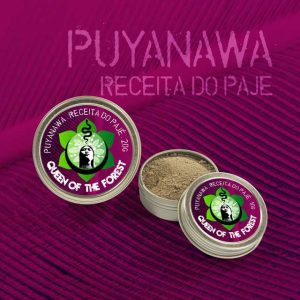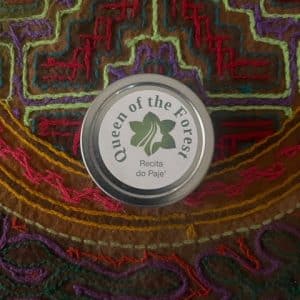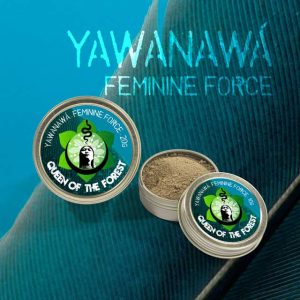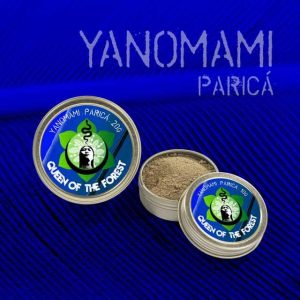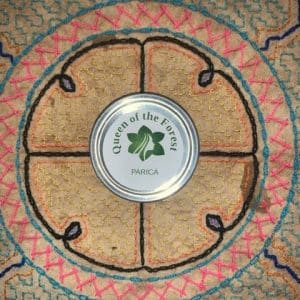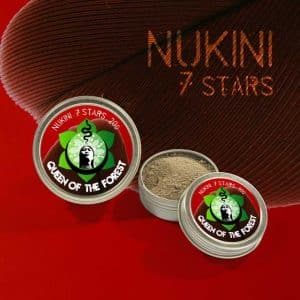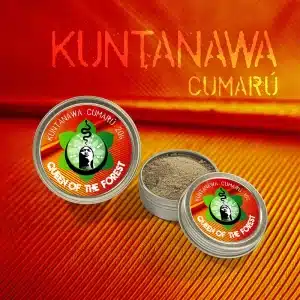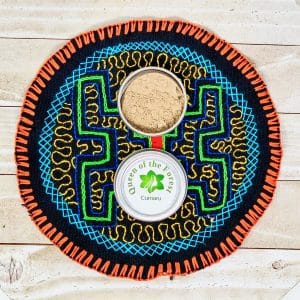What is Rapéh (Hapeh, Rapé, Hapé) Snuff?
The Rapéh (pronounced “Ha-peh”) snuff is a sacred and legal herbal snuff from the indigenous peoples of the forest. It is said to heighten the awareness and the senses, clear and align your mind, your instinct and your intuition and help promote cleansing of the body and soul.
Its purpose is to drive away dark thoughts and bad vibrations and align you with your best self. To be used in moderation, preferably outdoors, in a sacred place.
Rapéh (we have adopted the h at the end of the word to differentiate it for that English word we all hate to even pronounce but the Portuguese word has no h at the end and the R in the begining is actually pronounce as an h so it sounds more like Hapéh)… It is usually made from a variety of sacred tobacco leaves, powdered and mixed with different types of herbs and tree ash, then ground into a fine, aromatic powder that is blown into the nostrils.
Its use is ancient and has been prominent in many different cultures throughout time. We specifically celebrate the traditions of its use by indigenous tribes and the caboclos of the forest, who use it for various purposes, including medicinal and ceremonial.
“I got to know rapéh through the Santo Daime church, as it is very popular among many ayahuasqueiros and daimistas. I understand it as a worthy ally like many other vegetal, mineral or animal substances of the forest, that are here to assist and teach those who can understand that where there is life, there is a science, a divine teaching that can help us in many ways, including physical, mental and spiritual.”
– Marcio Purusha
We recommend using the rapé outdoors as much as possible. Always make it a special moment, even if you use it more than once in your day. Make it a moment for centering yourself and coming back to the present. If you can, make a special request to the medicine; form a special relationship with it. It has magical powers and if you use it with respect it can help you release any kind of bad fluids or bad energy from your life, as well as awaken you ever more to being in the present moment, being in the heart and being one with nature, the cosmic and the divine.
We believe in the importance of appreciating the culture and traditions of the natural medicines, the existing ancestors who keep these traditions alive, and defending the historical rescue and preservation of this knowledge, at risk of disappearing amid the current trivialization of the traditional values and original cultures in modern society.
Here are some recommendations for Rapéh use based on our continued study and observation of this sacred medicine and its ancient traditions:
Commonly Asked Questions About Rapeh:
What is Rapé (Rapeh) Snuff?
Rapé (often spelled “rapeh”) snuff is a traditional herbal blend used by indigenous tribes in the Amazon basin, primarily in Brazil and Peru. This sacred snuff, often containing tobacco and a variety of other plants, is integral to the spiritual and cultural practices of these tribes. It’s used for healing, ritualistic, and communal purposes, offering both physical and spiritual cleansing.
How is Rapé Snuff Used?
Rapé is administered through the nose, using a special pipe called a ‘Tepi’ for self-application or a ‘Kuripe’ for use by another person. The snuff is blown into each nostril, often by a shaman or an experienced individual. This method of intake is believed to heighten the spiritual and therapeutic effects, aligning one’s energy and connecting them with the spirit world.
What are the Ingredients in Rapé Snuff?
The ingredients in Rapé vary significantly, but most blends contain Nicotiana rustica, a potent type of tobacco. Other ingredients can include ashes from various plants or trees, ground seeds, bark, and aromatic or medicinal herbs. Each tribe or shaman has unique recipes, often kept secret and passed down through generations.
What are the Benefits of Using Rapé?
Rapé is believed to offer numerous benefits. Spiritually, it’s used for grounding, clearing negative energy, and connecting with the spiritual realm. Physically, it can clear the sinuses, enhance focus, and relieve headaches or other ailments. However, these benefits are subjective and vary among individuals.
Is Rapé Safe to Use?
The safety of Rapé depends on the ingredients and the user’s health. Nicotiana rustica, a common ingredient, is a potent form of tobacco and contains nicotine, which can be addictive and have side effects. It’s crucial to approach Rapé with caution, especially for those with health issues related to nicotine or other ingredients.
How Does Rapé Differ from Regular Tobacco?
Rapé differs significantly from regular tobacco. It’s not just for smoking but for ceremonial and healing purposes. The Nicotiana rustica in Rapé is stronger than commercial tobacco, and the addition of other plants and ashes creates a unique blend with different effects.
Can Rapé be Used in Modern Therapeutic Practices?
While there’s growing interest in integrating traditional plant medicines into modern therapies, Rapé’s use in such contexts is limited. Its sacred nature, potential legal issues, and the need for respectful, knowledgeable application make it challenging to integrate into mainstream practices.
Is Rapé Legal to Use and Purchase?
The legality of Rapé varies by country and often depends on the specific ingredients in the blend. In some areas, the tobacco and other substances in Rapé may be regulated. It’s essential to research local laws and regulations before purchasing or using Rapé.
How Can One Respectfully Engage with Rapé Culture?
Engaging with Rapé culture requires respect for its indigenous origins and understanding of its sacred nature. It’s advisable to learn from knowledgeable, respectful sources and to approach Rapé use with reverence for its cultural and spiritual significance.
What is the Indigenous Understanding of Rapé (Rapeh) Snuff?
For indigenous communities in the Amazon, particularly in Brazil and Peru, Rapé (also spelled “rapeh”) is much more than a herbal blend. It’s a sacred, medicinal tool integral to their culture. This snuff, often a mixture of tobacco (Nicotiana rustica) and other native plants, is revered for its spiritual and healing properties. Indigenous peoples view Rapé as a way to connect with the spiritual world and cleanse the body and mind.
How Do Indigenous Peoples Use Rapé?
Rapé is typically used in spiritual ceremonies, administered through the nostrils using a pipe known as ‘Tepi’ in group settings or ‘Kuripe’ for personal use. The ritual is often led by a shaman or elder, who prepares and administers the snuff. It’s a communal activity, reflecting the deep bond within the tribe and their connection to nature.
What Are the Key Ingredients in Indigenous Rapé Recipes?
While the primary ingredient in Rapé is usually Nicotiana rustica, a potent form of tobacco, each tribe has its unique blend. These can include ashes from sacred trees, ground seeds, and various medicinal herbs. The exact composition is often a closely guarded secret, known only to the shaman or herbalists in the tribe.
What Spiritual Benefits Do Indigenous Peoples Attribute to Rapé?
Indigenous tribes believe that Rapé helps in spiritual cleansing, grounding the user, and providing mental clarity. It’s seen as a way to purify the mind and body, rebalance energies, and facilitate a deeper connection with the spiritual realm. It’s also used for prayer, meditation, and as a means of receiving guidance from ancestors.
Is Rapé Considered Safe in Indigenous Cultures?
Within indigenous cultures, Rapé is used with great respect and caution. Its safety is closely tied to traditional knowledge and practices. The communities understand the potent effects of Nicotiana rustica and other ingredients, and thus, use it in a controlled, ritualistic manner. It’s considered safe when used within these cultural guidelines.
How Does Indigenous Rapé Differ from Western Tobacco Use?
Indigenous Rapé is fundamentally different from Western tobacco use. For indigenous peoples, Rapé is not a recreational substance but a sacred tool for spiritual and medicinal purposes. The way it’s prepared, the intention behind its use, and its role in ceremonies distinguish it from regular tobacco consumption.
Can Rapé be Incorporated into Non-Indigenous Healing Practices?
The integration of Rapé into non-indigenous healing practices is complex. It involves not only understanding its medicinal properties but also respecting its cultural and spiritual significance. While there’s interest in traditional plant medicines, using Rapé outside its cultural context requires careful consideration and respect for its origins.
What Legal Considerations Surround Rapé in Indigenous Territories?
In indigenous territories, the use and preparation of Rapé are governed by tribal laws and customs. It’s an integral part of their heritage and is protected within their communities. However, outside these areas, the legality of Rapé can vary depending on the country and specific ingredients used in the blend.
How Can Non-Indigenous People Respectfully Engage with Rapé Culture?
For those outside the indigenous communities, respectful engagement with Rapé culture means learning from and acknowledging its sacred origins. It involves approaching Rapé with reverence, understanding its significance, and not appropriating or commercializing it without proper understanding and respect for its cultural roots.






 Join the Tribe
Join the Tribe
